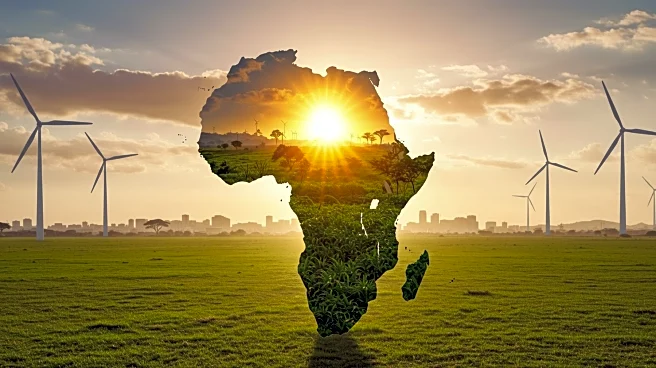What is the story about?
What's Happening?
UN Secretary-General Antonio Guterres has emphasized Africa's potential to become a 'renewable superpower' during the 9th Tokyo International Conference on African Development in Japan. Guterres called for increased investment in green energy across Africa, highlighting the continent's abundant natural resources suitable for renewable energy production, such as solar and wind power. The conference, attended by African leaders, including Nigerian President Bola Tinubu and South African President Cyril Ramaphosa, focused on development challenges exacerbated by debt crises, climate change, and reduced Western aid. Guterres stressed the need for mobilizing finance and technology to ensure Africa's natural wealth benefits its people, advocating for a thriving renewables and manufacturing base. He also warned against the dangers of debt hindering development and urged for increased concessional finance and lending capacity from multilateral development banks.
Why It's Important?
The call for investment in Africa's renewable energy sector is significant as it addresses multiple challenges faced by the continent, including energy costs, supply chain diversification, and decarbonization. By harnessing its renewable resources, Africa could reduce dependency on fossil fuels, lower energy costs, and contribute to global climate change mitigation efforts. The emphasis on investment over aid marks a shift in international development strategy, potentially leading to sustainable economic growth and job creation in Africa. This approach could also reduce the continent's vulnerability to external economic shocks and debt crises, fostering long-term stability and prosperity.
What's Next?
Following the conference, African nations may seek to strengthen partnerships with countries like Japan, which has expressed interest in training 30,000 individuals in artificial intelligence and exploring a Japan-Africa Economic Partnership. The focus on investment rather than aid could lead to new business opportunities and technological advancements in Africa. Additionally, discussions with companies like Toyota for e-mobility solutions indicate a move towards cleaner transportation options, aligning with global sustainability goals. The success of these initiatives will depend on the ability to secure financing and implement effective policies that support renewable energy development.
Beyond the Headlines
The push for renewable energy in Africa also has ethical and cultural implications, as it promotes self-reliance and empowerment of African nations. By investing in local resources and technology, Africa can reduce its dependency on foreign aid and influence, fostering a sense of ownership and pride in its development journey. This shift could also lead to cultural exchanges and collaborations, enhancing global understanding and cooperation. Furthermore, the focus on renewable energy aligns with global efforts to combat climate change, positioning Africa as a key player in the transition to a sustainable future.
















